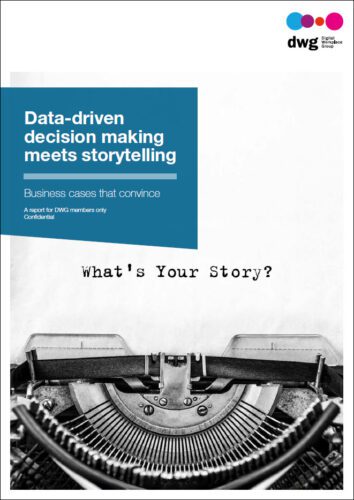Digital workplace transformation benefits and challenges

In today’s ever-evolving world of work, digital transformation is more than a trend – it’s a fundamental shift in how organizations operate and how employees experience their workplace. As businesses face new pressures and opportunities, understanding what digital transformation truly means is the first step towards building a thriving, future-ready workplace.
The benefits of digital transformation in business can be clear and measurable. Organizations that invest in creating people-centred, technology-enabled workplaces will lead the way to a more resilient, productive and engaging future.
Ready to explore how your organization can unlock these benefits?
The benefits of digital workplace transformation
Here at DWG we are seeing that organizations across every sector are reimagining how work gets done. The shift isn’t just about keeping up with technology trends – it’s about unlocking new ways to drive success. The benefits of digital workplace transformation include helping businesses to become more resilient, efficient and employee-focused.
Potential for increased productivity and seamless collaboration
One of the clearest benefits of digital transformation done well is the potential for employee productivity via easier access to the tools and information they need to get their work done. Cloud platforms, project management tools and real-time communication apps remove the digital friction that can slow teams and individuals down. Digital workplaces enable communication and collaboration across geographies, time zones and departments – helping employees to share knowledge and deliver results faster.
Enhanced employee experience and engagement
A modern, intuitive digital workplace improves the employee experience, leading to higher engagement levels. Employees feel more connected, empowered and supported when digital tools are designed around their needs – not just around operational processes. Investing in the right platforms can show a tangible commitment to employee success and wellbeing.
Better work–life balance with flexible working models
Flexible work models have moved from a ‘nice-to-have’ to ‘must-have’. A digitally enabled workplace supports remote and hybrid arrangements, helping employees to manage their work–life balance more effectively. For organizations, this often translates into better retention rates, a wider talent pool and a stronger employer brand.
Cost savings on office space and IT infrastructure
Digital workplaces can significantly reduce operational costs. Cloud solutions lower the need for heavy on-premise infrastructure, while hybrid work models can lead to reduced office space needs. The result? Leaner budgets, with funds available for strategic innovation rather than maintenance.
Stronger business resilience
If the pandemic taught businesses anything, it’s the value of resilience. Organizations that had already embraced digital transformation were better prepared to pivot to remote work, maintain operations and support their people during disruption. Building a digitally agile workplace today strengthens preparedness for tomorrow’s challenges.
Find out more about Digital Workplace Group’s digital transformation servicesCommon digital transformation challenges and change management
While the potential of digital transformation can be huge, the path to achieving it isn’t always smooth. From cultural resistance to skills gaps, organizations often face obstacles that can delay or derail progress. Recognizing these digital transformation challenges early, and applying robust change management practices, is critical to delivering meaningful, sustainable outcomes.
Resistance to change
Fear of the unknown is natural. Employees may worry about job security, new systems or changing team dynamics. Leaders, too, can resist shifts in operating models. Addressing these concerns through clear communication, transparency and involvement in decision-making is essential. Strong change management frameworks can turn resistance into enthusiasm.
Ensuring a seamless hybrid work experience
Building a cohesive experience across hybrid or remote teams is no small task. Different departments may adopt new tools unevenly, creating friction. Success requires not only rolling out technology but also continuously gathering feedback, refining user experiences and ensuring digital equity for all employees.
Security concerns with remote access and cloud solutions
As digital workplaces expand, so does the risk surface. Employees accessing systems remotely increases potential vulnerabilities. To counter this, organizations must invest in security measures like zero trust frameworks and prioritize data privacy from the outset of any digital transformation initiative.
Managing digital overload
Introducing too many tools can overwhelm employees. Constant notifications, fragmented platforms and unclear digital etiquette can lead to burnout. Smart digital workplace strategies focus on integrated solutions and streamlined experiences, and foster a culture of mindful technology use.
Skills gaps and the need for continuous upskilling
Rapid technological advances mean yesterday’s skills aren’t always enough for tomorrow’s work. Building digital confidence through training and change management is critical. Organizations must invest in continuous learning opportunities, not just at the point of technology rollouts, but as an ongoing part of workplace culture.
Why change management matters
Technology can only deliver value if people adopt it. Successful digital transformation depends on active change management: clear goals, strong communication, leadership involvement, user-focused training and continuous support. Organizations that weave change management into their transformation strategies enjoy faster adoption, higher engagement and stronger returns on investment (ROI).
Conclusion
Digital transformation challenges are real, but they are far from insurmountable. By applying thoughtful, employee-first change management principles, organizations can not only overcome hurdles – they can build more resilient, adaptable workplaces.
As an early pioneer of the digital workplace transformation concept and a leading voice and key influencer in the industry, DWG supports organizations globally with a range of services geared towards a smooth digital workplace transition, guiding them through digital workplace best practices and helping to formulate and implement a successful digital workplace strategy.
Ready to guide your organization through successful change?
For more digital workplace resources, DWG members have full access to exclusive articles, events, peer insights and a Research Library of 100+ reports covering key areas such as digital workplace transformation, digital employee experience, AI readiness, strategy and governance, change management and more. Contact us to learn how to gain access to this library via DWG membership.
Categorised in: Digital workplace transformation

